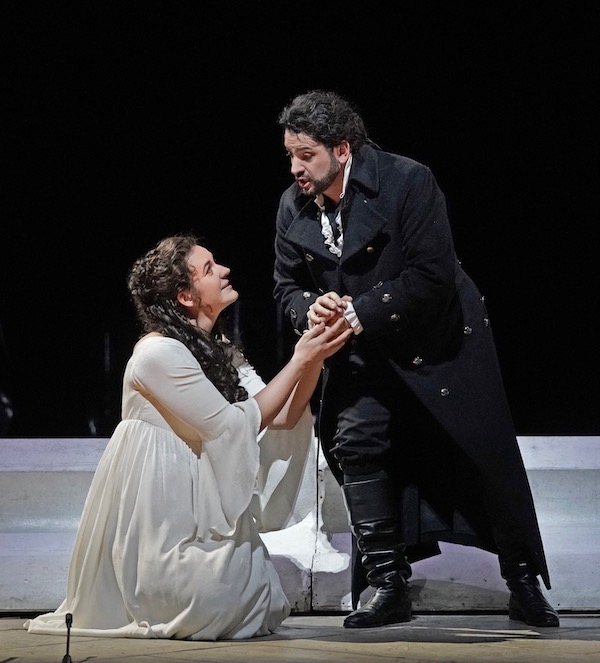Lise Davidsen’s memorable debut leads strong cast in Met’s “Queen of Spades”

It’s not often these days that a debut leads the marquee in a performance at the Metropolitan Opera. In the era of the international superstar, major companies are more likely to try to fill the house by advertising a bankable name than by enticing audiences with the promise of new talent.
So when a soprano gets the PR blitz that Lise Davidsen has enjoyed for her introduction to the Met, it’s hard to miss. The company managed to draw what looked like a sellout crowd the day after Thanksgiving for the season premiere of Tchaikovsky’s The Queen of Spades, after a lengthy profile in the New York Times in which Antonio Pappano called the Norwegian soprano “A one-in-a-million voice” and Peter Gelb dubbed her “the next great Brünnhilde.”
Those predictions will have to wait for now, but there’s no question Davidsen scored a major success in her house debut as Lisa. She boasts a voice of startling power, with bright color and warmth from top to bottom, but even more impressive than the voice itself is Davidsen’s astonishing technique. Whether bringing soft glow to an intimate moment in her middle voice, or finding focus in her bright, bell-like top, she was always in complete control of her instrument. Even her highest notes never felt the slightest push, sounding as comfortable as though she had approached them from above.
That complete confidence in her technique opened up a wide range of emotive possibilities in every part of her voice. Her final aria in Act III, “Akh, istomilas ya gorem” (I am worn out with suffering), showed focus and fullness in her upper register, with a warm clarity, that seemed to hang in the air and effortlessly fill the house. If there’s any complaint to be made over this debut, it’s that Davidsen didn’t have a chance at a role with more dramatic depth. As it was, she was committed to finding the inner life of her character, crafting an emotional arc for each of her scenes.
Yusif Eyvazov continues to build an impressive career at the Met. Here he appeared as Hermann, the brooding lover who’s always one hard glance away from the bottom of the Neva River. The Azerbaijani tenor is ideally suited to this role, thriving as he pushes his warm voice to its limit, where it takes on a golden brilliance.
Hermann is the sort of character for whom joyous rapture and mortal despair are emotions of the same color. That passionate intensity is nowhere more apparent than in “Prosti, nyebesnoye sozdanye” (Heavenly creature, forgive me), the pleading aria near the end of Act I, where he begins to believe Lisa might requite his love. It was here that Eyvazov was at his best, as the urgency of the moment was reflected in the bright fire of his singing.
The third in their love triangle, Prince Yeletsky, was played by Igor Golovatenko in another excellent debut. He gave a noble rendition of “Ya vas lyublyu” (I love you beyond all measure), his profession of love to Lisa, singing with restrained but sincere passion and showing off a flowing, caramel baritone with a bright ring.
Alexey Markov was a luxury in the role of Count Tomsky, with his muscular, woody baritone and natural dramatic flair. Tomsky is not a major driver of the plot but boasts several memorable arias, all of which were exemplary in Markov’s delivery. The “Three Cards” ballad in Act I showed off his musical versatility, combining smarmy cheeriness with declamatory power and crafting subtle, expressive phrases with his viscous, dark tone.
Larissa Diadkova brought a veteran’s confidence in her vivid performance as the Countess, the title’s “Queen of Spades.” She was a towering presence on the stage, coming on in a parade of Disney-villain dresses and immediately cowing anyone who so much as looked at her. Her mezzo-soprano showed a bony toughness that suited her character’s steely edge.
As Lisa’s companion Pauline, Elena Maximova displayed a powerful, hard-edged mezzo-soprano. She continues to struggle with a wide vibrato and inaccurate pitch up high, problems not uncommon for a mezzo voice of this size, but her chest voice showed a tautness that lent her singing an attractive grit. Leah Hawkins offered a generous mezzo as Masha, one of Lisa’s maids, and Mané Galoyan made a fine debut, showing off a tart soprano as Chloë in Act II’s pastoral pageant. Raymond Aceto stood out in the small role of Sourin with his rich, granite bass.
Tchaikovsky achieves an enormous amount with the material he’s given, mining the high-strung passions of the drama for musical inspiration and delivering rich melodic writing. Yet the libretto is hard to follow, as his brother Modest’s convoluted treatment of Pushkin’s story tangles together its plot lines, and shoves the story’s symbolic core to the edge of the scene until after the fate of the characters has already been decided.
The Met’s 1995 production by Elijah Moshinsky does not try to clarify the scenario, focusing only on immersing the viewer in the world and atmosphere of the work, largely through the stylized period costumes by Mark Thompson. A marble picture frame around the entire scene adds little, but Paul Pyant’s stark lighting helps to create an all-pervading gloom that suits the darkness of the subject.
Making his own debut in the pit, Vasily Petrenko led a capable if somewhat disjointed performance, drawing lustrous sound from the orchestra. He struggled to maintain energy in extended scenes, largely because there was little sense of dramatic progression in his conducting. Individual moments were executed with conviction, but rather than building from one to the next he would roll right through a climactic transition, as if moving on to an entirely new idea.
The Queen of Spades runs through December 21 at the Metropolitan Opera. Kristian Benedikt sings the role of Hermann on December 18. metopera.org






